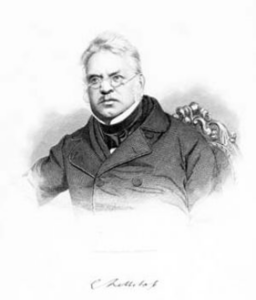Message of love
(Poet's title: Liebesbotschaft)
Set by Schubert:
D 957/1
[August 1828]
Part of 13 Lieder nach Gedichten von Rellstab und Heine (“Schwanengesang”), D 957
Rauschendes Bächlein,
So silbern und hell,
Eilst zur Geliebten
So munter und schnell?
Ach, trautes Bächlein,
Mein Bote sei du;
Bringe die Grüße
Des Fernen ihr zu.
All ihre Blumen
Im Garten gepflegt,
Die sie so lieblich
Am Busen trägt,
Und ihre Rosen
In purpurner Glut,
Bächlein, erquicke
Mit kühlender Flut.
Wann sie am Ufer,
In Träume versenkt,
Meiner gedenkend
Das Köpfchen hängt,
Tröste die Süße
Mit freundlichem Blick,
Denn der Geliebte
Kehrt bald zurück.
Neigt sich die Sonne
Mit rötlichem Schein,
Wiege das Liebchen
In Schlummer ein.
Rausche sie murmelnd
In süße Ruh,
Flüstre ihr Träume
Der Liebe zu.
Babbling little stream,
So silver and bright,
Are you rushing to my beloved
So cheerfully and quickly?
Oh dearest little stream
Be my messenger;
Take my greetings
From afar to her.
All her flowers
Looked after in the garden,
Which she so lovingly
Wears on her breast,
And her roses
With their crimson glow,
Little stream, refresh them
With your cooling waters.
When she is on the river bank
Falling into daydreams
Thinking of me
As her little head hangs down;
Comfort my sweet girl
With a friendly glance,
For her beloved
Will soon be returning.
When the sun begins to set
With a reddish glow,
Rock my beloved
To sleep.
Babble and mutter to her
In her sweet rest,
Whisper to her dreams
Of love.
All translations into English that appear on this website, unless otherwise stated, are by Malcolm Wren. You are free to use them on condition that you acknowledge Malcolm Wren as the translator and schubertsong.uk as the source. Unless otherwise stated, the comments and essays that appear after the texts and translations are by Malcolm Wren and are © Copyright.
☙
Themes and images in this text:
By water – river banks Chest / breast Dreams Evening and the setting sun Flowers Gardens Gazes, glimpses and glances Greetings Lullabies Messengers Near and far Red and purple Rest Rivers (Bächlein) Rocking Roses and pink Silver Sweetness Whispering
In our (over?) connected society we sometimes need to make an effort to understand what it was like for people in a world with limited literacy to remain in touch with each other. The lover who is giving instructions to this river declares that he is sending his greetings ‘from afar’, but that is probably as much an emotional as a physical gulf. If he has to work in the fields all day he cannot see or even wave to his girlfriend, who is probably confined to the house and garden back in his village. They may only be a few hundred metres apart, but there is no other connection than the stream.
He commissions the little rushing stream to carry his message and perform a few tasks on his behalf. He treats the river as a confidant and trusts his secrets to it (it is worth remembering that a ‘Bote’ could mean an ‘ambassador’, not just a simple ‘messenger’, so he is entrusting it with a diplomatic mission). Its babbling should speak directly to the girl, assuring her of his affection. Its water needs to refresh the flowers in her garden (and thus those she wears close to her heart). Its appearance as she looks dreamily into it from the river bank has to offer reassurance and promise. Its movement should rock and lull her gently, as its babbling and murmuring whisper secrets that she becomes aware of in her dreams.
All of these actions have to be carried out vicarously and at a distance. The fact that the lover cannot speak to the girl, cannot touch the flowers on her breast or her red roses only intensifies the strength of his desire. He wants to do more than water her roses. Because he cannot gaze into her eyes, because he cannot sing her to sleep, because he cannot rock and cradle her he tells the river to do so. His declaration defers his gratification and intensifies his longing.


Photo: Malcolm Wren
☙
Original Spelling and note on the text Liebesbotschaft Rauschendes Bächlein, So silbern und hell, Eilst zur Geliebten So munter und schnell? Ach trautes Bächlein Mein Bote sey Du; Bringe die Grüße Des Fernen ihr zu. All' ihre Blumen Im Garten gepflegt, Die sie so lieblich Am Busen trägt, Und ihre Rosen In purpurner Gluth, Bächlein, erquicke Mit kühlender Fluth. Wann1 sie am Ufer, In Träume versenkt, Meiner gedenkend Das Köpfchen hängt; Tröste die Süße Mit freundlichem Blick, Denn der Geliebte Kehrt bald zurück. Neigt sich die Sonne Mit röthlichem Schein, Wiege das Liebchen In Schlummer ein. Rausche sie murmelnd In süße Ruh, Flüstre ihr Träume Der Liebe zu. 1 Schubert changed 'Wenn' (If or When) to 'Wann' (When)
Confirmed by Peter Rastl with Gedichte von Ludwig Rellstab. Erstes Bändchen. Berlin, bei Friedrich Laue. 1827, pages 103-104; and with Gesammelte Schriften von Ludwig Rellstab. Neue Ausgabe. Zwölfter Band. Gedichte, Leipzig: F. A. Brockhaus. 1860, pages 80-81.
To see an early edition of the text, go to page 103 [119/265] here: http://digital.ub.uni-duesseldorf.de/download/pdf/3376501


